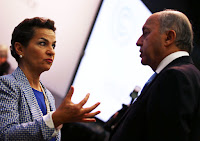Earlier this month, a group of nations that call themselves the Vulnerable Twenty held a meeting in Lima. The group, which goes as the V20, comprises countries that have contributed very little to the causes of climate change but are likely to suffer disproportionately from its effects; they include Afghanistan, Bangladesh, Ethiopia, and Vietnam. In its first communiqué, the V20 called for “urgent and ambitious global climate action.”
In the world of climate negotiations, there are many blocs—some of them overlapping—that jostle for influence. These include the Like Minded Developing Countries, or L.M.D.C.s; the Least Developed Countries, or L.D.C.s; the Alliance of Small Island States, or AOSIS; and the Group of 77, or G77, which, confoundingly, has a hundred and thirty-four member countries. The formation of yet another bloc, just a few weeks before world leaders are supposed to meet in Paris to hammer out a global climate accord, did not seem to bode well for an agreement. And, indeed, this week, at a set of pre-Paris talks in Bonn, negotiations took a new and decidedly acrimonious turn.
In an effort to speed up the negotiating process, two diplomats—Dan Reifsnyder, from the United States, and Ahmed Djoghlaf, from Algeria—had been asked to come up with a streamlined version of a draft accord. But the twenty-page document they presented to the delegates in Bonn (trimmed from an earlier eighty-page version) seems to have had pretty much the opposite effect. Many delegates expressed outrage with the new text, saying that it favored the interests of richer nations by, for example, ignoring language that poorer countries had proposed on the issue of financing. Speaking for the G77, Nozipho Joyce Mxakato-Diseko, a South African diplomat, went so far as to liken it to “apartheid.”
...
But whatever happens in Paris, a few things about the accord, or non-accord, are already clear. One is that the world is still hoping to combat climate change—a global problem if ever there was one—without settling on a global approach. Just last week, a group of world leaders, including German Chancellor Angela Merkel and the World Bank president Jim Yong Kim, issued a statement calling on all countries to impose a price on carbon. This, they said, is the only way to effectively and efficiently reduce global emissions. The call was clearly meant to influence the negotiations leading up to Paris, but the draft agreement includes no mention of carbon pricing. Meanwhile, even if it did, it’s not clear what good it would do, since carbon prices—or, if you prefer, carbon taxes—would have to be imposed at a national or local level. And in many countries, most notably the United States, the chances of getting such a tax enacted seem close to nil.
A second thing that’s clear is that the piecemeal approach to which countries have subscribed will not achieve the collective goal these same countries set themselves, six years ago, in Copenhagen: avoiding warming beyond two degrees Celsius (3.6 degrees Fahrenheit). So far, a hundred and fifty nations have submitted “intended nationally determined contributions,” or I.N.D.C.s, outlining the steps they plan to take to reduce their own emissions or, in many cases, at least their “emissions intensity.” Several groups have been tracking the submissions. According to one called Climate Action Tracker, if every single country lives up to its I.N.D.C.—a big if—global temperatures will rise by about 2.7 degrees Celsius, or almost five degrees Fahrenheit, by 2100. According to another group, Climate Interactive, the rise will be more like 3.5 degrees Celsius, or more than six degrees Fahrenheit. (The large difference in projections has to do with what the two groups predict countries will do after the period covered by the I.N.D.C.s, which is only a decade.) A recent paper in the journal Environmental Research Letters points out that the I.N.D.C.s submitted by China, the U.S., and the European Union leave those countries on track to burn through all that remains of the world’s two-degree budget by 2030.
Read more at The Bumpy Road to Paris

No comments:
Post a Comment